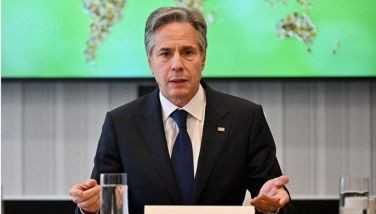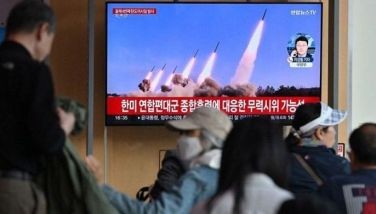Mexico president's can-do image is put to the test
MEXICO CITY — President Enrique Pena Nieto came to power Dec. 1 with a swagger.
His Institutional Revolutionary Party, for all its faults, knew how to govern. He promised a new Mexico, an economic powerhouse far from its image as a violence-torn land overrun by drug traffickers. He passed radical reforms for education and telecommunications and proposed more for energy and taxes.
But nine months later, as Pena Nieto prepares to give his first state of the nation address on Monday, the new Mexico still looks a lot like the old one. Economic growth projections have been cut nearly in half. The streets are clogged with anti-reform protesters, who have blocked Congress and even forced the president to change the date and location of that state of the nation speech.
Drug-related killings are down, his government says without releasing statistics. But kidnapping and extortion, the crimes affecting average citizens that Pena Nieto promised to attack, are on the rise.
After 12 years out of office, the once-autocratic party known as the PRI is encountering a more complicated, democratic country than the one it ran for 71 years.
"They have to learn how to govern in a new context where there are a greater number of new voices from new spaces, and there is less control," said Alberto Aziz Nassif, an analyst with the Center for Investigations in Social Anthropology.
With GDP growth projections dropping from 3.1 to 1.8 percent this year, and protesting teachers forcing legislators to shelve a key piece of his education reform, Pena Nieto cancelled a trip to Turkey to rescue the meat of the education reform in Congress.
"Let me tell you, in this effort we will not relent. We will not surrender. We are going firmly and with determination to make education reform happen," he said at a presidential stop on Wednesday celebrating Senior Citizens Day.
Pena Nieto worked during the campaign to convince voters that they were voting for a new PRI, devoid of the corruption and coercive tactics that got the party kicked out in 2000. He was elected in July 2012 as an alternative to six years of the Felipe Calderon administration, which was marked by a bloody and divisive attack on organized crime and a legislative agenda in many ways similar to Pena Nieto's that fell victim to a divided Congress.
"In fact, the mood was very hopeful for early, rapid and instantaneous change," said Virgilio Bravo, researcher at the Technological Institute of Monterrey.
The PRI won the presidency but not majorities in Congress. So Pena Nieto touts as his first major achievement getting the three major parties to sign a pact to drive major reforms in Congress. In his first month, he secured the constitutional amendments necessary to launch the biggest change in the Mexican educational system in more than six decades.
In quick succession, he led Congress and the states to approve more constitutional changes aimed at reducing the power of Mexico's long-time monopolies in telephone and television.
Optimistic headlines followed. New York Times columnist Thomas Friedman declared that Mexico "will become the dominant economic power in the 21st Century."
Pena Nieto continued, jailing education union leader Elba Esther Gordillo on corruption charges just as she was promising to take her million-strong membership to the streets to protest the reform, seeming to neutralize a giant political beast practically overnight. The new education union leader is in step with the changes and the major teachers' union is quiet.
But Pena Nieto's administration didn't seem to anticipate the power of a smaller, more radical teachers' union adept at mobilizing people and immobilizing cities. Their protests of the last week paralyzed parts of Mexico City and managed to get lawmakers to withdraw, at least temporarily, a cornerstone of the reform: mandatory teacher evaluations for job security and promotion, which under the current system are mostly determined by cronyism.
Failure to pass that measure would bode ill for Pena Nieto's next, more controversial move: reforming the moribund state-owned oil company to allow private companies to explore and exploit Mexico's vast oil and gas reserves.
Mexico's oil fields are drying up and Pemex lacks the equipment to explore in deep water or to extract shale gas. Production has plunged about 25 percent over the last decade. But the proposed reform requires constitutional changes that strike at the heart of one of Mexico's proudest moments: President Lazaro Cardenas' nationalization of the oil company in 1938.
Led by Cardenas' son Cuauhtemoc, a leftist leader, thousands marched through the heart of Mexico City on yesterday to protest against the energy reform. Thousands of others have taken over the capital's main plaza, camping out to protest the education measure.
And more controversy looms: the government plans to introduce a tax reform widely expected to include an unpopular sales tax on food and medicine.
"What we're seeing is that the honeymoon doesn't last forever and that in the end, governing is a complicated exercise that requires a great ability to negotiate and establish relations with various political and social forces," said Helena Varela, political sciences director at the Iberoamerican University.
Pena Nieto won the 2012 presidential election with only 38.2 percent of the vote, with leftist candidate Andres Manuel Lopez Obrador at nearly 32 percent. His approval ratings so far, around 50 percent, have been surprisingly low for a new president in Mexico, where 70 or 80 percent popularity is not unusual.
In the days leading up to his speech, he has run television ads to try to boost the mood.
"We've achieved necessary reforms, including constitutional, and we will achieve more. Why? Because the country comes first," Pena Nieto says in front of the symbolic National Palace.
But taking on teachers, Mexican oil nationalism, media and telephone magnates and consumers all in the same year may have been a political miscalculation.
"That's a multi-billion-dollar question everyone is asking right now," said Duncan Wood, director of the Washington-based Mexico Institute. "I don't think they were really prepared for this ... There's a perfect storm of factors coming up that are proving to be the biggest test so far."
- Latest
- Trending



























